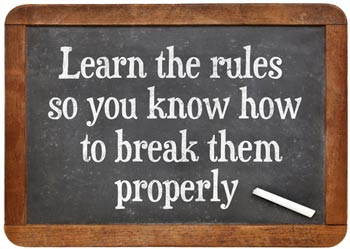Today’s post is an excerpt from 10 Core Practices for Better Writing. Enjoy!
“And all dared to brave unknown terrors, to do mighty deeds, to boldly split infinitives that no man had split before—and thus was the Empire forged.” — Douglas Adams
Everyone knows the old saying: rules were made to be broken. But some people love rules, live by them, and wouldn’t dream of breaking them. For these folks, good grammar means strict adherence to every rule, no matter how archaic or minute.
That’s too bad.
Don’t get me wrong. Rules are good. They keep us organized, consistent, and civilized. If there were no rules, we’d all be living in a perpetual state of anarchy.
Learning the Rules
In the world of language, rules help us understand each other. After all, language is merely a series of sounds that are organized according to a set of rules. Without rules, language would just be a bunch of noise.
The rules of grammar are designed to help us communicate clearly, both in our speech and in our writing. When proper grammar is absent, writing is sloppy, inconsistent, and difficult to read. To put it bluntly, we need grammar in order to make sense.
When a writer hasn’t bothered to learn the rules of grammar, it shows. The prose doesn’t flow smoothly or naturally, punctuation marks are strewn about haphazardly, and there’s no sense of clarity. Sentences are jumbled, words are misused, and paragraphs are disorganized. It’s a mess. The work is lazy and sloppy. Nobody wants to read it.
Failing to learn the rules of grammar leads to bad writing.
But some writers stubbornly refuse to bother with grammar, and they’re full of excuses: writing should be an art, the rules don’t make sense, and who made up these rules anyway? But these are all just excuses, poor rationale for avoiding the work that is involved in learning grammar and applying it.
Grammar is not easy to learn, let alone master. Writers, editors, and proofreaders must make a lifelong commitment to learning the rules and determining when the rules should be broken.
Breaking the Rules
Writers who are dedicated to their craft will invest the energy required to master their most basic tools, grammar being foremost among them. But there are situations in which it’s best to break the rules—as long as you know which ones you’re breaking and why.
There’s a difference between breaking the rules to make the writing more effective and breaking the rules because you don’t know what they are.
When we break the rules of grammar, one of two things happens: either the writing improves or it suffers. Writers who break the rules because they don’t know them are more likely to produce shoddy work. But when writers take the time to truly learn the rules, breaking them becomes an option, a technique that a writer can employ to add flair, color, and meaning to the text.
Sometimes sticking to the rules doesn’t make sense. This is especially true when we’re writing dialogue. People don’t speak in a manner that translates easily into proper grammar. So if our dialogue is written according to the rules of grammar, it can sound unnatural.
Additionally, many grammar rules were established a long time ago. Language is constantly evolving. If a particular rule makes the writing sound old-fashioned or outdated, then discarding the rule is probably the best option.
Learn the Rules and Learn How to Break Them
Here’s my advice: Learn the rules as thoroughly as you can, and then decide how to apply them on a case-by-case basis, depending on the audience and context. And keep writing!






I agree. Many of today’s writers, or perhaps their editors, are slipshod. On the other side, many of the greatest writers, such as John Steinbeck and Truman Capote, wrote as people speak and didn’t always use she said or he said to introduce the dialogue. If it sounds unnatural, then it is. I use Grammarly, a program that edits, corrects mistakes, and checks for plagiarism. I enjoyed your take.